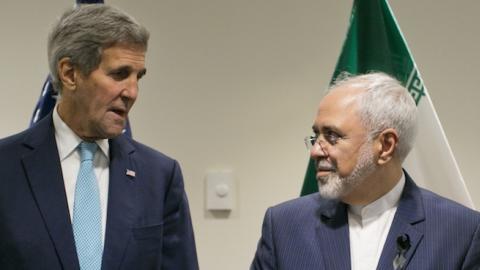Republican presidential candidates will keep Iran front and center as proof of the Obama administration’s national-security malpractice. But they don’t all seem to grasp why the Iran nuclear accord is flawed and why it matters so much.
Among the main criticisms is that the deal reflects President Obama’s lack of negotiating skill. But he knows how to negotiate — look at how he handled Congress on this matter. The accord is weak because along the way he changed his goal; he decided to paper over the nuclear problem in order to pursue a broader partnership between America and the clerical regime in Tehran.
Not long ago, President Obama promised to prevent Iran from having a nuclear weapon. He demanded that Iran dismantle its relevant facilities. And he implied (“all options are on the table”) that he would use military power, if necessary, to block Iran.
But after a while, he saw he couldn’t talk Iran’s clerical leaders out of their nuclear ambitions. Without admitting as much, Mr. Obama gave up on stopping Iran. Instead, he aimed simply to slow them down for a while.
That was a momentous reversal. He signaled it by changing the way he talked. One couldn’t always hit home runs, he said. One had to bend to reality. What was important was getting the best deal possible.
This radical alteration of policy reflected President Obama’s strategic priorities. Dismantling Iran’s nuclear program, desirable as that would be, was less important in his view than remaking the U.S.–Iranian relationship overall.
The president doesn’t see Iran as an Islamist-extremist rogue-state enemy. He believes that tension between us has arisen not from Iran’s ideology, in which America is the “great Satan,” but from America’s own bad behavior. Identifying events in 1953 as the cause of the “tumultuous history” between us, he explains, “In the middle of the Cold War, the United States played a role in the overthrow of a democratically elected Iranian government.”
When Mr. Obama thought he could press Iran successfully on nuclear weapons, he was willing to try. But when that appeared impossible, he looked on the nuclear issue with impatience. It was impeding what he sees as an even more important project: transforming Iran into an American strategic partner. Mr. Obama came to view the nuclear issue as part of the Bush administration’s bad legacy, a pretext for refusing to improve ties with Iran. Lately, Obama-administration officials have begun to highlight shared interests, such as opposition to ISIS, the Sunni Islamist terrorist group.
U.S. negotiators accordingly made whatever concessions were necessary for a nuclear deal with Iran. They dropped demands for dismantlement of Iranian facilities and for anywhere, anytime inspections. They agreed to lift economic sanctions quickly, to end restrictions on missiles and other arms, and to help Iran obtain bank credit. They refrained even from asking Iran to release its American prisoners, to stop supporting terrorism, or to cease calling for Israel’s destruction.
Lip service to his original policy continues. Mr. Obama reiterates that an Iranian nuclear weapon is “unacceptable.” Those concessions, however, belie his tough talk. The Gulf Arabs know this, as do the Israelis, which is why the deal has spawned bitterness throughout Iran’s neighborhood. The president uses the deal’s complexity as a screen to hide the gap between his declared policy and his actual policy.
Which brings us to the “so what” question.
The deal will make Iran more dangerous, confirming it as a threshold nuclear-weapon state and absolving its nuclear activities from sin. Over $100 billion will become available to Iran when sanctions end.
Of greatest consequence, however, is the damage the deal will do to the world’s nuclear-non-proliferation apparatus. It’s hard to overstate this danger.
The 1969 Nuclear Non-Proliferation Treaty has nearly 190 state-parties. When Iran ratified in 1970, it foreswore nuclear weapons permanently, but it then violated the treaty. It quarreled about its prohibited nuclear program with the International Atomic Energy Agency, the United Nations Security Council, the so-called EU-3 (Britain, France and Germany), and the United States. From these quarrels, Iran has now, through this deal, emerged victorious. The accord lifts the U.N. sanctions without requiring Iran to destroy its nuclear facilities. Iran gets credit for reiterating the very promise that it breached previously, to renounce nuclear weapons forever.
Fifty years ago, the world had only five nuclear-weapons states. Only a wild optimist would have predicted that, 50 years hence, there would be fewer than ten. But the widespread commitment to non-proliferation proved astonishingly potent and helped protect the world from nuclear war. That accomplishment is what is undermined by the Iran deal — by Iran’s successful defiance of all the world’s main non-proliferation mechanisms.
The Iran deal will spur Saudi Arabia, Turkey, Egypt, and others in the region and beyond to acquire nuclear weapons. It says, in effect, that any country can have a nuclear weapon if it really wants one, without having to suffer pariah status. This will bring us closer to a world with dozens of nuclear-weapons states, a world in which the risks of nuclear war will increase enormously. What a terrible outcome! And what a shameful irony for President Obama, who came to office touting his commitment to reducing nuclear-weapon risks.
Things that seem like a big deal at the time rarely make it through history’s filter. But every once in a while, a problem of actual historical importance comes along. The Iran nuclear deal is such a problem.
Thirty years from now, when almost everything else that dominates today’s political news is at most a vague memory, the capitulation of the Obama’s administration to the ayatollahs is likely to be recognized as a turning point. It will be seen as the failure that undermined the most successful, arguably the only successful, arms-control regime in history.
















